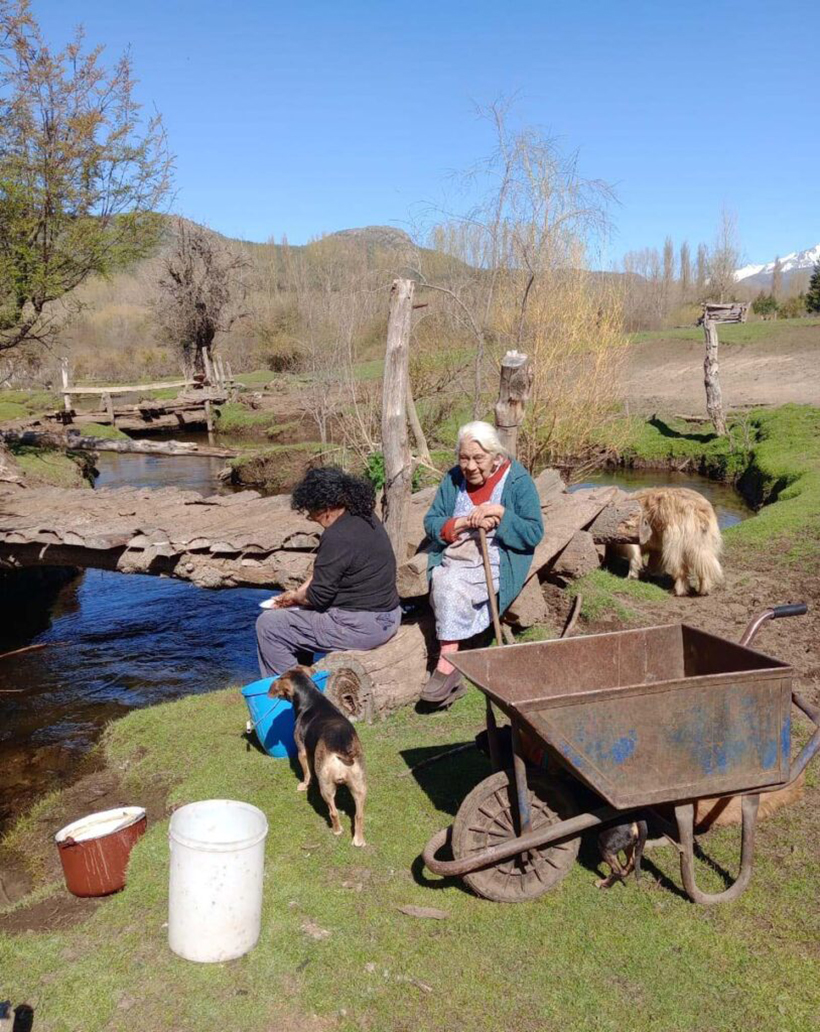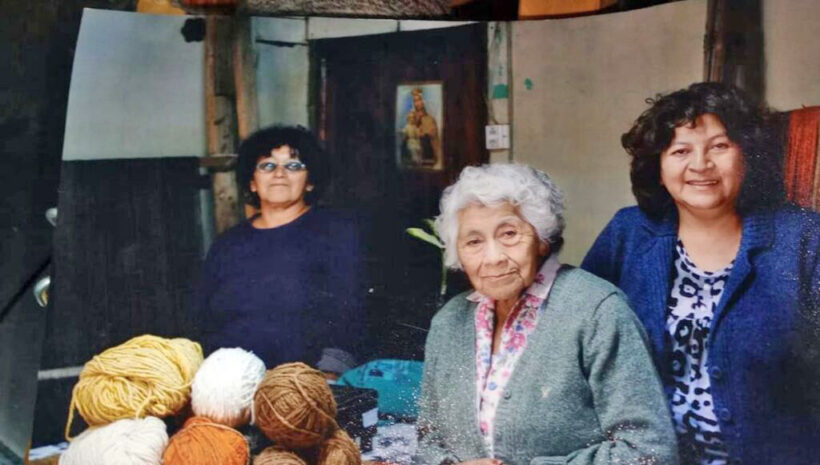The Coronado Inalef community is resisting eviction from its ancestral lands in El Bolsón.
The granddaughters and daughters of Sara Inalef, a 93-year-old Mapuche weaver and acknowledged master of the art of weaving, are resisting eviction from the territory in Mallín Ahogado that her family has inhabited for five generations. Today (25 March) they succeeded in stopping it. The story of a planned dispossession and the links with the last dictatorship.
By Camila Vautier/Cooperativa de Comunicación Popular Al Margen
The Mapuche community of Coronado Inalef has reported that the eviction scheduled for 15 March has been suspended pending the decision of the Court of Appeals. “This is another step in our struggle,” they stressed while denouncing the violence they have suffered throughout the judicial process. “We did not have the right to defend ourselves because the lawyer we had, Cristina Gonzalez, did not want to accept the different complaints that we wanted to present promptly, such as the complaints of death threats and the complaints of threats of rape against the pu lamgen zomo (women) of the lof Inalef,” they said in a statement.
Mariela Troncoso Coronado is a member of the community of Mallín Ahogado, 20 kilometers from El Bolsón, and the granddaughter of Sara Inalef. Together with her sister, her mother and her grandmother, she resisted the eviction ordered by Judge Juan Pablo Laurence, ratified by Judge Juan Martin Arroyo, and carried out by Francisco Arrien, a public prosecutor with experience in Mapuche evictions.
“There are many interests in this area, the land is coveted”, he asserts, alluding to the fact that “we are close to the ski slopes of the Perito Moreno”, exploited by the company Laderas S.A.
The community conflicts with the Sepúlveda Avilés family, who claim ownership of the land, and their representative, the lawyer Patricia Zavalía, who wants to keep two of the seven hectares in question.
This is how Mariela explains the origin of the events: “The owner of a sawmill, who was also a policeman and had good purchasing power, had Carlos Sepúlveda as a worker, whom he took to the Inalef territory and left as his woodcutter. As time went by, this man stayed there and later refused to leave. My grandmother complained and made demands, but she was never listened to. In 1976, during the military dictatorship, they processed the title deeds, which must not have been difficult because they had contacts with the authorities. My grandmother was forced to sign a demarcation agreement in exchange for peace”.
“We were denounced as usurpers because my grandmother was born here, her father worked the land all his life. We are the fifth generation; we have never left. My grandmother, my mother, and my aunt are all artisans. My mother gave weaving classes at EMETA, in 118, in El Manso, she is well known in the area,” she says.
In the same place, in the summer of 1976-77, at the beginning of the state terrorism, the military illegally detained Héctor Inalef, an 18-year-old Mapuche boy who disappeared for his family until 2013, when his sister Zunilda was able to finish primary school, learn about what happened during the last dictatorship and tie up the loose ends of her own experience. The siblings were reunited thanks to the sociologist Ayelén Mereb’s research on the period and her work with the Provincial Memory Archive.
 Lof Inalef denounced the lack of an indigenous perspective in the judicial process. Photo Al Margen
Lof Inalef denounced the lack of an indigenous perspective in the judicial process. Photo Al Margen
A story of planned dispossession
Mapuche communities have suffered from a long history of territorial dispossession through political and economic extractives projects. The province of Río Negro is no exception.
Last December, the legislature of Río Negro, under the impulse of the current governor, Alberto Weretilneck, reformed the Law of Fiscal Lands and the Code of Mining Procedures, without respecting the free, prior, and informed consultation of the Mapuche communities. In doing so, it changed the purpose of the land, adding mining and tourism as purposes and uses of the fiscal lands.
In addition, the council of El Bolsón recently approved an ordinance that changes the land use in Mallín Ahogado so that the rural land can be used for development, i.e. for real estate. “Does this have anything to do with the urgency of evicting Lof Coronado Inalef?” asked the APDH, referring to the local ordinance. In a communicate, they also denounced “the actions of the Río Negro justice system about indigenous rights” and demanded “a change in this orientation, which only brings more pain and injustice”. “We demand that territorial conflicts be dealt with under the paradigm of indigenous law and not in the criminal courts,” they concluded.
“The struggle continues”
In the days leading up to the attempted eviction, several human rights organizations, including CELS, expressed their support for the Coronado Inalef community.
“The possibility of being heard was not something we did alone, so we want to thank all the individuals, the different organizations, and the LOF that have come to our territory to support us in this struggle,” they said, expressing their gratitude for the support they have received. “The struggle continues, we are here and we are resisting more than ever,” concluded Mariela.






